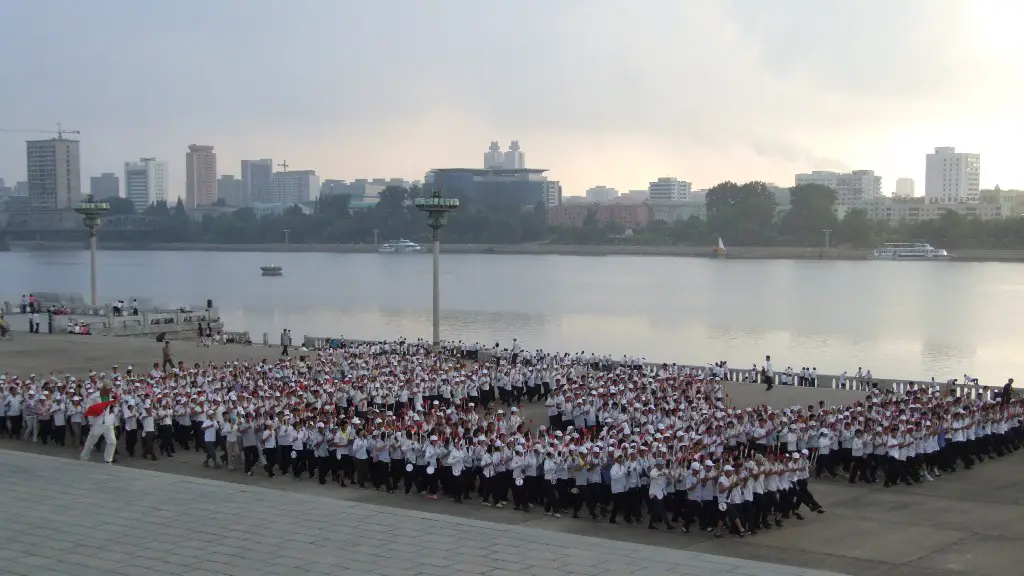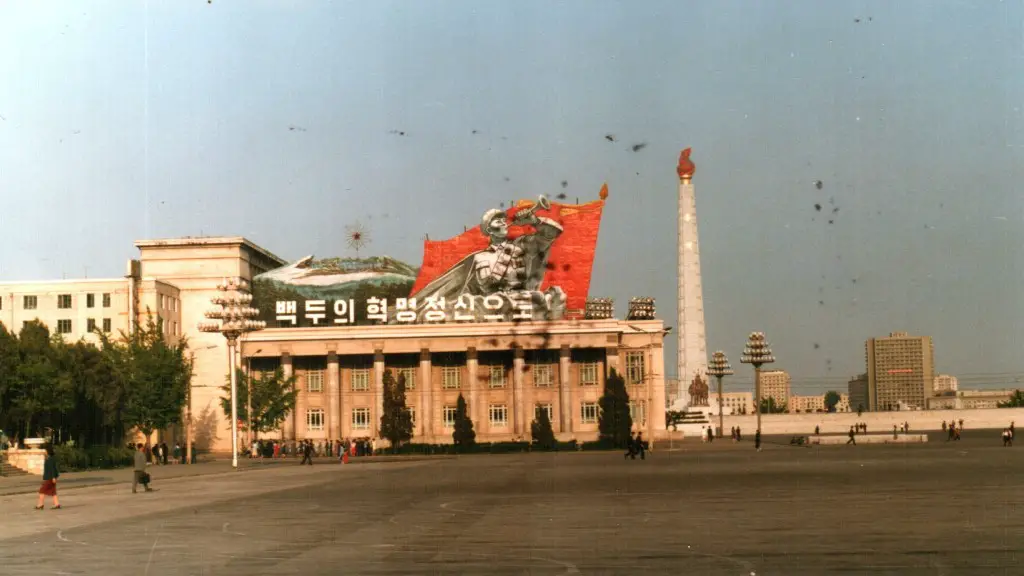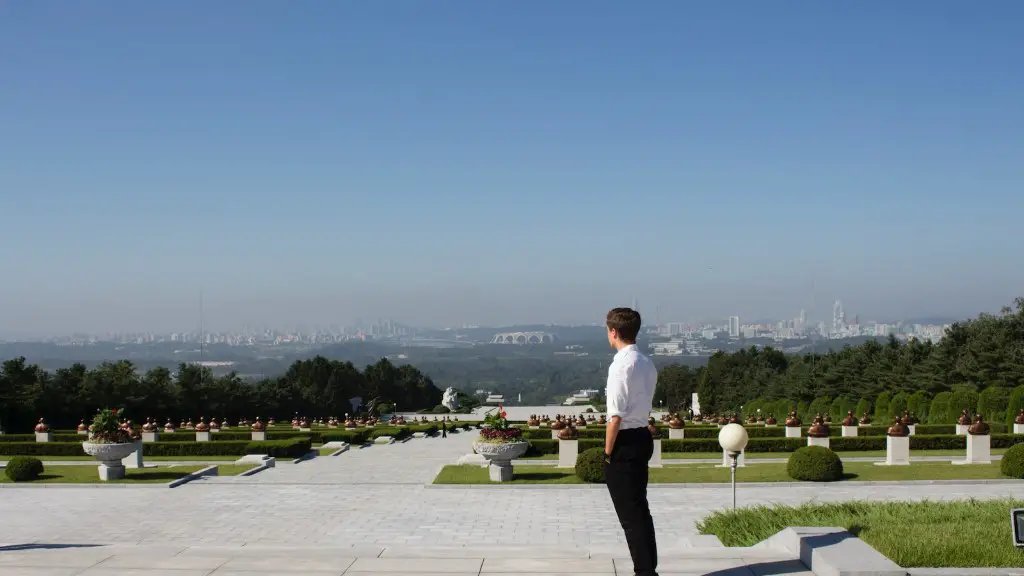Suppressing Freedom
North Korea has long been seen as one of the most secretive countries in the world, but why is that? One answer is the oppressive regime of the Kim dynasty. The North Korean government has always maintained a strict control over the media, ensuring that any information the public receives is tightly controlled and does not deviate from the party line. This level of control over the media has been likened to brainwashing, as the government attempts to ensure that the population of North Korea is accepting of their rule. This has been accompanied by harsh punishments for anyone who speaks out against the ruling party, no matter how small the offence may be.
However, the secretive nature of North Korea is not solely due to their oppressive nature. It is also largely due to the geographical location of the country and its economic situation. North Korea is surrounded by powerful neighbours such as China and South Korea, countries which have more developed economies and more freedom. North Korea is aware of this and is likely worried that any information that is made public could lead to comparisons between the countries, which would naturally make the North Korean regime look worse. To avoid this, North Korea keeps much of its information a secret.
A third reason why North Korea is so secretive is because of its foreign policy. North Korea is highly isolationist, which has resulted in it becoming more and more isolated from the rest of the world. This has resulted in North Korea becoming increasingly paranoid, likely believing that any information made public could be used against them. It is for this reason that North Korea has imposed such tight controls on the media, to ensure that any information released is strictly controlled by the state.
The secretive nature of North Korea is also the result of decades of militarisation and the development of nuclear weapons. This militarisation has been an important part of the state’s identity, and it has become closely linked with the Kim regime. As a result, North Korea is concerned that any information made public could lead to criticism of the state’s defence policy. This is why North Korea is so reluctant to reveal information, as they do not want to face criticism of their regime or its actions.
Repression of Dissent
North Korea is also notorious for its repression of dissent, and this is another factor that contributes to its secretive nature. The North Korean government has long been determined to prevent criticism of the regime, and has been known to use extreme measures to silence those who speak out. This includes the use of torture, imprisonment and even public executions in some cases. North Korea’s attitude towards dissent has resulted in a widespread fear amongst the public, who are unwilling to speak out for fear of retribution. This has created a sense of subdued acceptance of the regime, which has served to further reinforce the secretiveness of the government.
The fear of retribution has also resulted in many North Koreans choosing to lie about their true opinions, for fear that their true beliefs may lead to punishment. This has created a situation where it is extremely difficult to accurately gauge the true opinion of the North Korean public. This makes it even more difficult for the outside world to gain an accurate understanding of what life is really like for the average North Korean, as opinions can be easily swayed by the fear of punishment.
The North Korean government has also been known to employ a variety of other methods to silence dissent. For example, they have been known to use disinformation campaigns to mislead the public and divert attention away from any potential criticism of the regime. Furthermore, they have been known to employ spies in key positions throughout the country, ensuring that any potential dissent is nipped in the bud before it can gain any traction.
The repressive nature of the North Korean regime has created an atmosphere of fear and paranoia, where the public do not feel comfortable speaking freely. This serves to reinforce the secretive nature of the government, as information is not freely shared and any potential dissenting views are swiftly silenced.
The Threat of Sanctions
Another reason why North Korea is so secretive is the threat of economic sanctions from the international community. For many years, the North Korean government has been subject to a range of economic sanctions in response to its nuclear weapons program and human rights violations. This has had a detrimental effect on the North Korean economy, as the sanctions have meant that the country lacks access to much of the technology and resources that other nations take for granted. As a result, the North Korean government has become increasingly reliant on secrecy, in order to protect its interests.
The threat of economic sanctions has also caused North Korea to become more isolated from the international community. The North Korean government is aware that any information that is made public could be used against them in the form of sanctions, so they are even more unwilling to risk revealing anything. This is why North Korea has become so secretive, as it is their way of protecting themselves from the threat of economic sanctions.
The threat of sanctions has also caused North Korea to become increasingly paranoid about foreign interference. North Korea is extremely wary of outside influence, and as a result they are hostile towards any foreign journalists or researchers that attempt to visit the country. This further reinforces the secretive nature of North Korea, as they are unwilling to provide any information that could be used against them.
In short, the threat of sanctions has made North Korea even more secretive, as they are unwilling to risk revealing any information that could be used against them in some way. This serves to further reinforce the secretive nature of North Korea, as they are unwilling to risk the possible consequences of revealing too much.
International Pressure
The secretive nature of North Korea is also the result of international pressure from foreign countries. The United States and other western powers have long been critical of North Korea’s human rights record, which has resulted in a great deal of scrutiny and criticism from the international community. This has made the North Korean government even more reluctant to reveal any information, as they do not want to face any further criticism or condemnation.
Furthermore, the international community has long been pushing for North Korea to open up and become more transparent in its activities. This has put the North Korean government in a difficult position, as they do not want to open up to criticism but also are aware that they need to respond to the international pressure. As a result, North Korea has adopted a more secretive approach, in order to insulate itself from any criticism and avoid revealing any information that could lead to further sanctions or censure.
The international community has also been critical of North Korea’s nuclear weapons program, and has called on the North Korean government to abandon its weapons program in order to open up dialogue with the international community. However, the North Korean government has been unwilling to do this, as they believe that their nuclear capabilities are the only way to ensure their security. As a result, North Korea has been reluctant to reveal any information on its weapons program, as they do not want to open themselves up to further criticism.
In summary, international pressure has only added to the secretive nature of North Korea, as the government is even more unwilling to reveal any information that could lead to further criticism or sanctions. This serves to further reinforce the secretive nature of North Korea, as the government is even less willing to open up to the outside world.
Isolationism
Finally, it is worth noting that North Korea’s secretive nature is largely the result of its isolationist foreign policy. North Korea has long been isolated from the rest of the world, leading it to become increasingly paranoid and suspicious of outsiders. North Korea sees the outside world as a threat, and as a result, they are highly reluctant to reveal any information that could be seen as critical of their regime.
The North Korean government has also been known to use propaganda and disinformation to spread their own version of the truth. North Korea has long relied on propaganda to influence the public’s opinion, and it has been successful in creating a false image of the regime as powerful and infallible. This has made the North Korean public less likely to speak out against the regime, which has only served to further reinforce the secretive nature of the government.
The secretive nature of North Korea is also a result of its economic and political situation. North Korea has one of the weakest economies in the world, and this is one of the main reasons why it has been so isolated from the outside world. Furthermore, the North Korean government is aware that any information revealed could be used to further weaken their position, so they are highly reluctant to reveal anything.
In short, North Korea’s isolationism has only served to further reinforce its secretive nature. North Korea is unwilling to open itself up to potential criticism, so it has adopted a policy of strict secrecy in order to protect itself. This has made it even more difficult for the outside world to gain a true understanding of life in North Korea.
Exploring the Unknown
North Korea remains one of the most mysterious and secretive countries in the world and much is still unknown about life within its borders. Despite the oppressive nature of the regime and the extreme measures they have taken to silence dissent, there is still hope that North Korea may someday open itself up to the outside world. In the meantime, it is important to remember that North Korea is more complex than the secretive nature of its regime and the international community should continue to explore the unknown.
The North Korean regime has always been careful to control the information that is released to the public, in order to maintain their power and control over the population. However, it is likely that if more information is made available, it could potentially lead to greater understanding of the North Korean government and people, as well as greater sympathies towards them. By breaking down the barriers of secrecy, the international community could be able to gain a better understanding of the North Korean people, and the struggles many of them face under the rule of the Kim dynasty.
Furthermore, if more information is released from North Korea, it could serve to break down the image of North Korea as an oppressive and secretive state. This could also serve to discredit the notion that North Korea is an “evil empire”, as this is rarely an accurate portrayal of the situation. Instead, it could lead to greater understanding of the complex political and social situation in North Korea, and the difficulties that the North Korean people face on a daily basis.
It is difficult to speculate as to when, or if, North Korea will ever open up to the outside world. However, it is clear that greater understanding of the North Korean regime and the situation of the North Korean people could have an important role to play in the process. It is only when more information is made available that we can begin to comprehend the reality of life within the secretive state.





